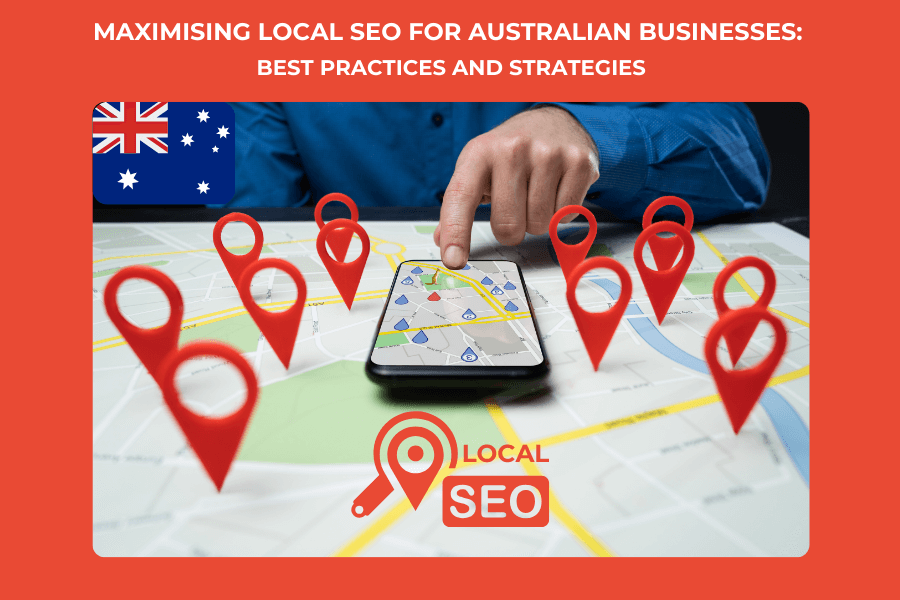
Maximising local SEO for Australian businesses: Best practices and strategies
Local Search Engine Optimisation (SEO) is essential for Australian businesses seeking to attract customers in their immediate vicinity. Research shows that 88% of consumers who conduct a local search on their smartphone visit a related store within 24 hours, underscoring the importance of a strong local online presence. This guide covers proven strategies to help Australian businesses thrive in local search results, boost visibility, and build stronger connections with nearby customers.
Why local SEO matters for Australian businesses
The rise of “near me” searches
Australians are increasingly using location-based searches, with terms like “near me” and “open now” growing by over 200% in recent years. This shift represents a huge opportunity for local businesses, allowing them to reach high-intent customers exactly when they’re looking for specific products or services.
Mobile-first consumer behaviour
Mobile devices drive over 60% of local searches in Australia. Whether someone is looking for the best coffee in Melbourne or a nearby dental clinic in Brisbane, local SEO ensures businesses show up in those crucial on-the-go moments.
Competitive edge for local SMEs
Local SEO is a powerful tool for small and medium-sized enterprises (SMEs) to compete with larger corporations in their region. By targeting local markets through strategic SEO practices, Australian businesses can dominate in their area without needing the broader reach required by large, national brands.
Top strategies to boost local SEO for Australian businesses
1. Optimise your Google Business Profile (GBP)
Your Google Business Profile (formerly Google My Business) is often the first touchpoint between your business and potential customers. It’s essential to optimise it for maximum impact:
- Claim and verify: Ensure you’ve claimed and verified your listing for authenticity.
- Accurate NAP (Name, Address, Phone): Consistency across online platforms is key.
- Detailed business information: Include business hours, accurate descriptions, and services offered.
- Visual appeal: Upload high-quality photos and videos of your storefront, products, or team to create a welcoming online presence.
- Encourage reviews: Actively seek reviews from satisfied customers and respond to feedback to show customer commitment, which can also boost your local rankings.
2. Leverage location-specific keywords
The right keywords make it easy for search engines to connect users to your business:
- City and region keywords: Use terms like “Sydney plumber” or “Perth coffee shop” in your content and meta tags to target specific areas.
- Australian spelling and phrasing: Incorporate local spelling and terms. For example, "favourite" instead of "favorite" can help Google associate your business with Australian audiences.
- Landmarks and suburb names: If you’re near popular locations like Bondi Beach or the Sydney Opera House, mention these to capture relevant local traffic.
3. Create locally relevant content
Local content is a powerful way to engage with your community and improve local search rankings:
- Blog about local events: Cover topics like “Top spring festivals in Melbourne” or “The best hiking trails near Canberra.”
- Highlight community involvement: Showcase your engagement with local events or charities to build a stronger connection with local audiences.
- Customer success stories: Share testimonials or case studies from customers in your area, reinforcing trust with potential clients.
4. Optimise for voice search
Voice search is gaining popularity, and optimising for it can help you capture more local traffic. Consider that voice search queries tend to be conversational and question-based:
- Use natural language: Incorporate long-tail keywords that reflect how people speak.
- FAQs: Add an FAQ section with questions like “Where’s the best coffee shop nearby?” to capture voice search traffic.
5. Build local links and citations
Backlinks from reputable local websites enhance SEO and boost credibility:
- Partner with local businesses: Collaborate with complementary businesses for cross-promotions and backlinks.
- Local directory listings: Submit your business to trusted Australian directories, such as Yellow Pages and local Chamber of Commerce listings.
- Engage with local media: Contact local journalists or influencers to feature your business in regional news or articles.
Technical optimisation for local SEO
To gain a competitive edge in local search, ensure your website is technically optimised for both search engines and user experience:
Website structure
- Schema markup: Add schema markup to help search engines understand your business’s location and type.
- Mobile responsiveness: Ensure your website adapts to different screen sizes since local searches are often conducted on mobile devices.
- Page load speed: Slow-loading websites can negatively impact both user experience and search rankings.
- HTTPS security: Security is a ranking factor; make sure your site is protected with HTTPS.
On-page optimisation
- Location in meta tags: Use city and region keywords in title tags, meta descriptions, and headers.
- Consistent NAP: Keep your name, address, and phone number consistent across all pages and platforms.
- Alt text for images: Use location-based keywords in image alt text to improve search visibility.
Tracking and measuring local SEO success
To determine the effectiveness of your local SEO efforts, monitor the following metrics:
- Local pack rankings: Track your position in Google’s local pack.
- GBP insights: Google provides valuable data on how users interact with your business profile.
- Local organic traffic: Monitor your traffic for spikes in local visitors.
- Customer actions: Measure phone calls, direction requests, and form submissions from local visitors.
- Review quantity and quality: Regularly analyse the volume and sentiment of online reviews.
Emerging trends in local SEO for Australian businesses
As digital marketing evolves, local SEO is also undergoing transformations. Here’s what Australian businesses should keep an eye on:
AI-powered search and personalisation
Search engines like Google increasingly use AI to understand user intent better, making it vital to provide rich, contextually relevant content. Additionally, personalisation in search results means businesses should focus on creating authentic, user-focused content.
Ethical business practices and sustainability
With more consumers seeking eco-friendly and ethical brands, businesses can enhance their local appeal by promoting sustainability initiatives or ethical business practices—especially relevant for Australia’s eco-conscious consumers.
Local SEO isn’t just a marketing strategy; it’s an essential approach for Australian businesses aiming to stand out in their regional markets. By consistently optimising your Google Business Profile, creating location-relevant content, building quality local links, and staying up-to-date with SEO trends, your business can achieve sustained local visibility and growth. Keep refining your efforts based on changing algorithms and consumer preferences, and your local SEO strategy will continue to drive results.
